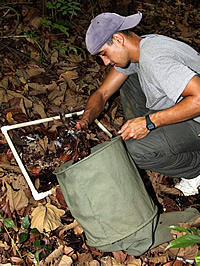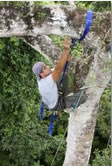Donaghey Program Offers Scholar Bird’s-Eye Views
Ask Petrus Fauaze Moreira how he spent his summer vacation, and he’ll tell you he climbed trees. But these weren’t ordinary trees, and Moreira wasn’t taking an ordinary vacation. The 22-year-old senior studying biology at UALR spent three weeks climbing trees towering 100 feet atop the Panamanian rainforest as a field assistant for Dr. Stephen P. Yanoviak, assistant professor of biology and renowned ant researcher.
 “When Dr. Yanoviak told me about an opportunity to be his field assistant, doing tropical research in Panama, I was blown away,” said Moreira, a native of Brazil. The student is a member of UALR’s elite Donaghey Scholars Program, an undergraduate honors program that offers a generous financial package, interdisciplinary core curriculum, study abroad, and a supportive learning community for the university’s top learners. Members of the Donaghey Scholars Alumni Society also supported Moreira’s trip by awarding him a Donaghey Society Research Grant.
“When Dr. Yanoviak told me about an opportunity to be his field assistant, doing tropical research in Panama, I was blown away,” said Moreira, a native of Brazil. The student is a member of UALR’s elite Donaghey Scholars Program, an undergraduate honors program that offers a generous financial package, interdisciplinary core curriculum, study abroad, and a supportive learning community for the university’s top learners. Members of the Donaghey Scholars Alumni Society also supported Moreira’s trip by awarding him a Donaghey Society Research Grant.
“I was very anxious and excited to have some hands on, practical experience, outside the university atmosphere,” Moreira said. “Not only would I be traveling to a foreign country, to work in the tropics — an environment I love everything about — but I would be under the guidance of a very respectable professor and researcher.”
Yanoviak and his assistant were based at a Smithsonian Institution research station located on Barro Colorado Island in the Panama Canal this summer. Each day, they took a small boat to the Gigante Peninsula and hiked to 16 plots spread throughout the forest, collecting samples of leaf litter on the forest floor, part of two major research projects.
“First, we are measuring the importance of lianas — woody vines — to biodiversity of ants in the rain forest canopy,” Yanoviak said. “Liana abundance has been increasing at a rapid rate due to climate change, and this is expected to have dramatic effects on the structure of tropical forests over the next 50 years. We want to know how that change will affect ant diversity because ants are very important to the forest ecosystem.”
Yanoviak — who holds degrees from Auburn, Purdue, and the University of Oklahoma — said they extracted insects and other arthropods from the collected litter.
“These critters will then be sorted and identified by students in my lab at UALR,” the professor said. “We will repeat the litter collections after liana removal and see how the arthropod communities change in response to the opening of the canopy and the pulse of new litter that is created by liana mortality.”
 A second project required involved Moreira to scale giant trees in the rain forest to examine and observe the gliding behavior of canopy ants to help answer the question: why do ants glide.
A second project required involved Moreira to scale giant trees in the rain forest to examine and observe the gliding behavior of canopy ants to help answer the question: why do ants glide.
“It’s a very exciting and at the same time relaxing experience,” Moreira said of his experience climbing the massive trees. “During the climb there is a lot of adrenaline, but once I reached the canopy, I settled down on a branch, took a breath, and enjoyed the beautiful view of the forest canopy and the canal at a distance before getting to work.”
Moreira said he expected three weeks of routine work, but everyday was a unique experience.
“I was surrounded by one of the most diverse environments in the world — an infinite amount of flora and fauna,” he said. “I saw toucans, crocodiles, deer, iguanas, all sorts of small mammals — sloths, an ocelot, an ocelot eating a sloth, monkeys, including the white faced capuchin, spider monkeys and — my favorite — the howler monkeys.”
He said howlers could be heard all across the forest and sounded like giant barking dogs.
“One time while up on a tree, I got to see a whole family of these monkeys on the tree right next to mine,” Moreira said.
He also was fascinated by the community of scientists and researchers at the research station, which he called a “camp for scientists.”
“There were people from all around the world: from the U.S., Germany, Colombia, Italy, Bosnia, the Netherlands, Austria, Panama, and more. Many of these people were working on their master’s, Ph.D.’s, or post-doctoral studies,” Moreira said. “Most of these professors or researchers also had field assistants like me. I was able to get to know and become friends with everyone on the island.”
Four years after he enrolled at UALR and three years after becoming a Donaghey scholar, Moreira graduates in December 2010 with a Bachelor of Science in biology. His next move: graduate school at UALR with plans to become a field biologist.
“These three weeks at Barro Colorado Island, I have to say, were some of the best experiences I have had in my life,” he said. “I learned so much from Dr. Yanoviak and others. I feel like this will add so much more to my credentials and confidence in myself. Being surrounded by science and individuals who, like me, love tropical biology, I have an amazing feeling that I contributed to important research.
“Thanks to Dr. Yanoviak and the Donaghey Scholars Program for offering me these wonderful, life-changing opportunities.”